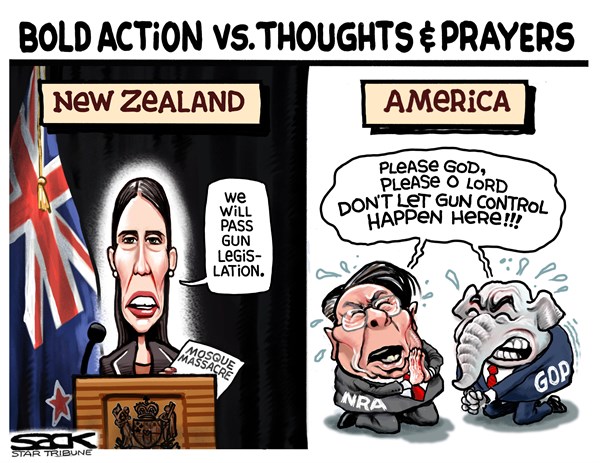America’s Gun Violence War
The War Happening Within Our Borders

“Thoughts and prayers don’t stop shootings…we have to work to build a less violent generation in a country founded on violence,” stated David Hogg, a survivor of the Parkland School shooting, during a recent speech at UCSB. Tragically the number of deaths from firearms has increased to 40,000 a year. Citizens of America, there is virtually a war happening within our country. Metal detectors, armed guards in churches and shopping malls, and lockdowns at every school — what has happened to our nation? We are no longer the land of the free when we don’t feel safe in our homes, schools, churches, and on the streets.
David Hogg correctly stated that we are a country founded on violence. The Revolutionary War and the Civil War were necessary, but must they remain harbingers of America’s future? Consider two countries, Australia and New Zealand, whose citizens did not respond to a mass shooting by buying more guns. They quickly understood that stricter gun laws were essential. Why are Americans more violent? The 2nd Amendment in itself does not encourage violence. Madison inserteded the 2nd Amendment into the Bill of Rights, not with the purpose of an individual right to own a firearm, as the new interpretation states, but for the purpose of arming the citizenry in case of an attack, as there was no standing army at that time.
Read it thoughtfully and carefully: “A well-regulated Militia, being necessary to the security of a free state, the right of the people to keep and bear Arms shall not be infringed.”
However, even with the present interpretation, we may focus on the first three words: “A well-regulated.” Therefore we are able to pass sensible gun violence prevention laws.
The debate in Australia and developments in subsequent years shows how a country can successfully deal with gun violence. In Port Arthur, Tasmania, 35 people were murdered and 18 were wounded by an assailant with a semiautomatic rifle. The public outcry brought together Australia’s political parties from the right and the left to take major action. Sadly, in comparison with Australia, the U.S. Congress has done nothing.
Within months the Australian government “banned automatic and semiautomatic firearms, adopted new licensing requirements, established a national firearms registry, and instituted a 28-day waiting period for gun purchases,” according to The Atlantic. There was widespread opposition at the time to the legislation. But gun control proponents pointed out that most gun-related killings are not perpetrated by people with criminal or psychiatric records.
The government also bought and destroyed more than 600,000 civilian-owned firearms, in a national gun buyback that cost half a billion dollars and was funded by raising taxes. The entire action took just months to implement.
In the 17 years before these laws were passed, 13 mass shootings occurred in Australia. Since 1996, there have been none. In addition the country experienced a two-thirds decline in the overall rate of firearm deaths.
In comparison, the 32 students killed slaughtered at Virginia Tech and 20 first grade children mowed down at Sandy Hook have brought zero response from the United States Congress. Parents in tears pleading for universal background checks and a ban on assault weapons and large capacity magazines did not move Congress to take a single action toward reasonable gun violence prevention.
On Saturday, June 15, from 8 a.m. to noon at Santa Barbara’s Earl Warren Showgrounds, the Coalition Against Gun Violence and the city Police Department have organized their fifth anonymous gun buyback. In the past four gun buybacks, almost 1,200 firearms were collected in exchange for Smart & Final gift cards.
This is the second year the City of Santa Barbara has contributed $10,000 to the buyback. Hopefully the importance of a gun buyback will encourage the County of Santa Barbara, every city in the county, and perhaps some businesses to contribute to the buyback in 2020.
Do gun buybacks make a difference? They have in Australia. At the coalition’s first gun buyback press conference, a member of the press asked, “What would you consider a success?” Immediately Santa Barbara County Cistrict Attorney Joyce Dudley said, “One gun. One gun could save a life.”
Mass shootings and suicides don’t seem to encourage Americans to speak out or take action. As you read this, how many degrees of separation are you from knowing a relative, friend, or neighbor who was killed by a gun? We are all touched by gun violence.
For more information or to contribute to this year’s gun buyback, please visit sbcoalition.org or crowdrise.com.
Toni Wellen chairs the Coalition Against Gun Violence.



